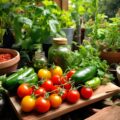New York City is home to a thriving culinary scene, and some of the city’s most innovative chefs are embracing the farm-to-table movement. This approach emphasizes using fresh, locally-sourced ingredients, often grown by the restaurants themselves. Here are eight NYC restaurants that are leading the way in farm-to-table dining.
1. Blue Hill
Located in Greenwich Village, Blue Hill is a pioneer in the farm-to-table movement. The restaurant sources much of its produce from its own farm, Blue Hill Farm, located in the Hudson Valley. The menu changes frequently based on seasonal availability, ensuring that every dish is fresh and locally sourced.
2. Brooklyn Grange
While not a restaurant itself, Brooklyn Grange supplies many NYC restaurants with fresh produce grown on its rooftop farms. Restaurants like Roberta’s, Egg, and Marlow & Sons use Brooklyn Grange’s produce to create delicious, farm-fresh dishes.
3. Rosemary’s
Rosemary’s, located in the West Village, features an extensive rooftop garden that supplies the restaurant with fresh herbs and vegetables. The menu features Italian-inspired dishes that highlight the flavors of the garden, including homemade pasta and seasonal salads.
4. Bell Book & Candle
This West Village gem uses a unique hydroponic system to grow its own produce on-site. Bell Book & Candle’s vertical garden provides the restaurant with fresh herbs, greens, and vegetables year-round, ensuring that every dish is as fresh as possible.
5. Loring Place
Chef Dan Kluger’s Loring Place in Greenwich Village focuses on seasonal, farm-fresh ingredients. The restaurant works with local farmers and also sources produce from its own urban garden. The menu features a mix of creative vegetable dishes and hearty mains.
6. Lighthouse
Located in Williamsburg, Lighthouse is committed to sustainability and locally-sourced ingredients. The restaurant partners with local farms and also grows some of its own produce. The menu includes a variety of fresh, healthy dishes that highlight the best of local ingredients.
7. Riverpark
Riverpark, located on the East River, boasts its own urban farm right next to the restaurant. The farm supplies Riverpark with fresh produce that is featured prominently on the menu. The restaurant offers a variety of seasonal dishes that celebrate the flavors of the farm.
8. Roberta’s
This popular Bushwick eatery is known for its wood-fired pizzas and commitment to local ingredients. Roberta’s sources much of its produce from its own urban garden and nearby farms. The menu changes frequently based on seasonal availability, ensuring that every dish is fresh and flavorful.
FAQ
1. What is farm-to-table dining?
Farm-to-table dining is a culinary movement that emphasizes using fresh, locally-sourced ingredients. Restaurants that embrace this approach often grow their own produce or source it from nearby farms, ensuring that dishes are made with the freshest ingredients available.
2. Why is farm-to-table dining important?
Farm-to-table dining supports local agriculture, reduces the carbon footprint associated with transporting food, and provides diners with fresher, more flavorful dishes. It also promotes sustainable farming practices and helps to strengthen local economies.
3. Are farm-to-table restaurants more expensive?
While some farm-to-table restaurants may be more expensive due to the higher cost of locally-sourced ingredients, many offer affordable options. The focus on quality and sustainability often justifies the price, providing diners with a unique and memorable dining experience.
4. How can I find farm-to-table restaurants in my area?
You can find farm-to-table restaurants by searching online, using restaurant review sites, and asking for recommendations from friends or local food enthusiasts. Many cities have directories or guides that highlight restaurants committed to using locally-sourced ingredients.
5. Can I grow my own food at home?
Absolutely! Growing your own food at home can be a rewarding and sustainable way to enjoy fresh produce. Even if you have limited space, you can start a small garden with herbs, vegetables, and even some fruits. Container gardening and vertical gardening are great options for urban dwellers.









